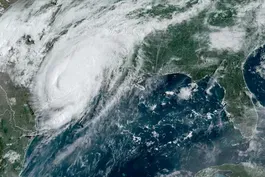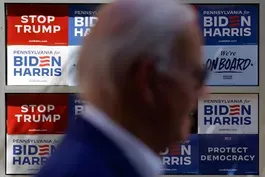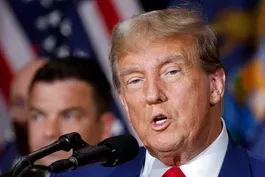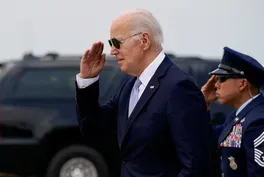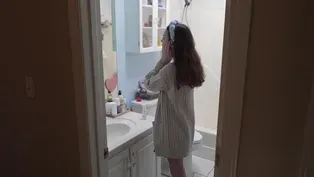
Poland's foreign minister on Ukraine's path to joining NATO
Clip: 7/9/2024 | 8m 44sVideo has Closed Captions
Poland's foreign minister on defending Ukraine and its path to NATO membership
The 32 members of NATO are meeting in Washington and the focus is largely on Ukraine. Members will announce they are sending new air defense systems a day after one of the worst attacks on Kyiv in years. Diplomats are also set to declare Ukraine’s path toward NATO membership. Nick Schifrin discussed more with Foreign Minister Radek Sikorski of Poland, one of Ukraine’s primary supporters.
Problems with Closed Captions? Closed Captioning Feedback
Problems with Closed Captions? Closed Captioning Feedback
Major corporate funding for the PBS News Hour is provided by BDO, BNSF, Consumer Cellular, American Cruise Lines, and Raymond James. Funding for the PBS NewsHour Weekend is provided by...

Poland's foreign minister on Ukraine's path to joining NATO
Clip: 7/9/2024 | 8m 44sVideo has Closed Captions
The 32 members of NATO are meeting in Washington and the focus is largely on Ukraine. Members will announce they are sending new air defense systems a day after one of the worst attacks on Kyiv in years. Diplomats are also set to declare Ukraine’s path toward NATO membership. Nick Schifrin discussed more with Foreign Minister Radek Sikorski of Poland, one of Ukraine’s primary supporters.
Problems with Closed Captions? Closed Captioning Feedback
How to Watch PBS News Hour
PBS News Hour is available to stream on pbs.org and the free PBS App, available on iPhone, Apple TV, Android TV, Android smartphones, Amazon Fire TV, Amazon Fire Tablet, Roku, Samsung Smart TV, and Vizio.
Providing Support for PBS.org
Learn Moreabout PBS online sponsorshipGEOFF BENNETT: Tonight in Washington, D.C., the 32 members of the North Atlantic Treaty Organization and allies from around the world are celebrating the alliance's 75th anniversary.
AMNA NAWAZ: NATO was born in the same room where President Biden spoke this evening, calling it -- quote -- "the single greatest offensive alliance in the history of the world."
The focus of his remarks fell on the alliance's work to prop up a non-member, Ukraine, in its war to repel Russia.
JOE BIDEN, President of the United States: We know Putin won't stop at Ukraine, but make no mistake.
Ukraine can and will stop Putin.
And Kyiv, remember, fellows and ladies, was supposed to fall in five days, remember?
Well, it's still standing two-and-a-half years later and will continue to stand.
(APPLAUSE) AMNA NAWAZ: The president concentrated his remarks on Ukraine, but the president himself and his political future are also very much a part of this summit, as is the possibility of a second Trump administration.
GEOFF BENNETT: Here's Nick Schifrin.
NICK SCHIFRIN: While questions around President Biden and former President Trump loom over the summit, the primary effort is Ukraine.
NATO members will announce they are sending new air defense systems one day after one of the worst attacks on Kyiv in years that destroyed a children's hospital and killed more than 40.
NATO will offer what its leaders call a bridge to Ukraine's membership, including a new command based in Germany led by a three-star general.
NATO is taking over what has been a U.S.-led effort to coordinate weapons assistance.
NATO will offer more training and financial assistance.
And diplomats tell me the document will declare Ukraine's path toward membership is -- quote -- "irreversible."
Poland has been one of Ukraine's primary supporters.
And its foreign minister, Radek Sikorski, is in Washington and joins me now.
Foreign Minister Sikorski, thanks very much.
Welcome back to the "News Hour."
I just laid out how NATO will support Ukraine.
(CROSSTALK) NICK SCHIFRIN: First of all, do you believe that NATO is supporting Ukraine enough?
RADOSLAW SIKORSKI, Polish Foreign Minister: Well, we have made a big effort, Europe and the United States together, about $300 billion so far, most of it from Europe.
So we are not free riders on this one.
The U.S. package has arrived at the battlefield.
Poland is an important hub.
Putin has threatened us, so we are now spending real money.
Poland has been spending 2 percent for 20 years.
Others are also doing that.
I believe 23 of the 32 members will now pass the threshold.
We are at 4 percent, going on 5.
But, yes, Ukraine desperately needs anti-aircraft defenses so that outrages like the one today should not happen in future and so that Putin understands that he can't win it.
NICK SCHIFRIN: But there is nothing binding in this document.
And, of course, there is ongoing European and even American resistance to offering Ukraine a concrete invitation to membership.
So, in fact, isn't much of this document reversible?
RADOSLAW SIKORSKI: Well, membership would mean that we would need to join the war against Russia.
And there is no appetite among Western publics for that.
But Ukraine is getting a lot.
And, remember, the Russian economy is suffering badly.
They are running out of their national reserve fund.
They are running out of Soviet-era tanks to refurbish.
Inflation is high.
Interest rates are very high.
In a year or two, Putin will be like Wilhelmine Germany.
He will run out of resources to continue.
NICK SCHIFRIN: Could the steps that NATO is taking this week be reversed by former President Trump if he became president again and oppose the steps that you're taking this week?
RADOSLAW SIKORSKI: Well, give credit where credit is due.
President Trump was right to call on NATO to spend more on some member states.
And I would even give him a pass on his inimitable style, because, when previous presidents said the same with traditional American politeness, it didn't work.
But we want to have the best possible relations with whoever is in charge.
NICK SCHIFRIN: You are a diplomat, of course, sir.
And with all due respect to your diplomatic answer, let me ask you about something that aides to former President Trump say they are proposing to him should he become president again, including going to Ukraine and threatening Kyiv with cutting off all U.S. weapons if it didn't go to the negotiating table, and then threatening Russia with flooding weapons to Ukraine if it didn't go to the negotiating table.
Is that a workable solution?
RADOSLAW SIKORSKI: Well, I like the second part more than the first part, because, remember, Russia can end this war in five minutes or in one day, as President Trump proposes it, but Ukraine can't, because it's just a victim resisting aggression.
So, yes, if they want to persuade Putin to give up by threatening him an escalation of support for Ukraine, that actually sounds to me like a good idea.
NICK SCHIFRIN: Another option, as floated by these aides, would be essentially creating two-tiers within NATO, and that Article 5 would only apply to countries paying more than 2 percent.
Is that a workable solution?
RADOSLAW SIKORSKI: Well, military alliances are not neighborhood security companies.
If you don't pay your bill, we take down your defenses.
You never know when you might need your allies.
These are -- this is an insurance policy for an emergency you cannot predict.
And allies are useful in all kinds of ways.
Allies should spend more, no question about it.
But to treat it this commercially would, I think, be a mistake.
NICK SCHIFRIN: Last week, you tweeted the following -- quote -- "Marcus Aurelius was a great emperor, but he screwed up his succession by passing the baton to his feckless son, Commodus, he from 'The Gladiator,' whose disastrous rule started Rome's decline.
It's important to manage one's ride into the sunset."
Are you saying that President Biden should drop out of the race?
RADOSLAW SIKORSKI: I'm saying that Marcus Aurelius screwed up his succession.
Look, we had a summit with President Biden in March, our president, our prime minister.
I was there.
An hour-and-a-half with President Biden was strategic focused and actually quite humorous.
But I'm not going to go into your internal politics.
NICK SCHIFRIN: There is, as you acknowledged, an enormous debate in this country about President Biden and his future.
Straight-ahead question here, is that debate overshadowing the summit here in Washington and your work, especially focused on Ukraine?
RADOSLAW SIKORSKI: Well, you are the most important country in NATO.
You account for a huge proportion of the defense expenditure.
So, of course, we follow American politics with attention and sometimes anxiety.
But we will determine -- we will work with whoever is president of the United States.
NICK SCHIFRIN: This week, Poland signed a security agreement with Ukraine that includes looking into the possibility of - - quote -- "intercepting in Ukraine's airspace missiles and UAVs fired in the direction of the territory of Poland."
Are you, a member of NATO, considering shooting down Russian missiles?
RADOSLAW SIKORSKI: Well, look, Russian missiles cross into Polish and therefore NATO airspace all the time.
I live in Western Poland, 500 kilometers away from the Ukrainian border, and yet a Russian missile landed 10 kilometers from my house.
Therefore, I think, legally, and also on commonsense ground, it would make sense to intercept them before they reach our airspace from inside our own airspace.
Those are the ideas that are doing the rounds, but we need to make decisions in the alliance.
NICK SCHIFRIN: If Polish interceptors, if NATO interceptors were used to interdict Russian UAVs or missiles over Ukraine's airspace, would that make those interceptors a legitimate target for Russian forces, and, therefore, does that risk escalation?
RADOSLAW SIKORSKI: No, Ukraine has been designated by the General Assembly of the United Nations as a victim of aggression.
We actually have a duty to help the victim defend herself.
Those UAVs and Russian missiles have no business being over Ukraine and murdering innocent people.
And when they come close to the NATO border, we have every right to defend ourselves too.
NICK SCHIFRIN: Polish Foreign Minister Radek Sikorski, thank you very much.
RADOSLAW SIKORSKI: Thank you.
Artists use talents to help San Jose reduce carbon footprint
Video has Closed Captions
How artists are using their talents to help San Jose reduce its carbon footprint (6m 38s)
Beryl leaves millions without power amid scorching heat
Video has Closed Captions
Hurricane Beryl leaves millions in Texas without power amid scorching heat (2m 31s)
Democrats navigate divisions around supporting Biden
Video has Closed Captions
Democrats navigate divisions around supporting Biden or calling for him to step aside (7m 53s)
The Project 2025 plan and Trump's links to its authors
Video has Closed Captions
A look at the Project 2025 plan to reshape government and Trump's links to its authors (6m 48s)
Rep. Crockett defends Biden amid Democratic concerns
Video has Closed Captions
'He has a record to run on': Rep. Crockett defends Biden amid Democratic concerns (6m 34s)
What's behind the tween skincare obsession
Video has Closed Captions
Tween skincare obsession fuels industry boom and raises concerns (7m 59s)
Providing Support for PBS.org
Learn Moreabout PBS online sponsorshipMajor corporate funding for the PBS News Hour is provided by BDO, BNSF, Consumer Cellular, American Cruise Lines, and Raymond James. Funding for the PBS NewsHour Weekend is provided by...

